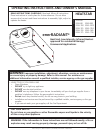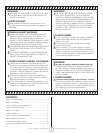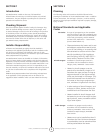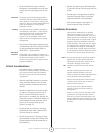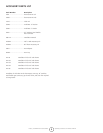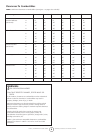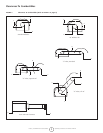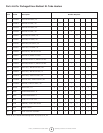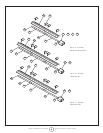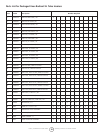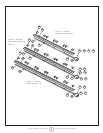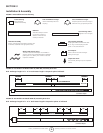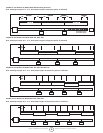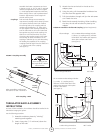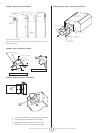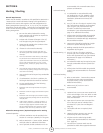
3
Operating Instructions and Owner’s ManualEnerco | enerRadiant® XL Series Heater
SECTION 1
Introduction
Ener-Radiant ERXL models are low-cost, eld assembled
infrared heaters that are easy to install and require only minimal
maintenance. They are designed to provide years of economical
operation and trouble-free service.
Checking Shipment
Check the shipment against the Bill of Lading for shortages. Also,
check for external damage to cartons. Note any shortages, and/
or external damage to cartons on the Bill of Lading in the presence
of the delivery trucker. The delivery trucker should acknowledge
any shortages or damage by initializing this “noted” Bill of Lading.
Immediately report any claims for damaged material, or shortages
that were not evident at the time of shipment, to the carrier and
your ENERCO Factory Representative.
Installer Responsibility
All heaters and associated gas piping should be installed in
accordance with applicable specications and this installation made
only by rms (or individuals) well qualied in this type of work.
Consult local building inspectors, Fire Marshals or your local ENERCO
Factory Representative for guidance.
Ener-Radiant ERXL heaters are installed on the basis of information
given in a layout drawing, which together with the cited codes and
regulations, comprise the basic information needed to complete the
installation. The installer must furnish all needed material that is not
furnished as standard equipment, and it is his responsibility to see
that such materials, as well as the installation methods he uses result
in a job that is workmanlike and in compliance with all applicable
codes.
ENERCO Factory Representatives have had training and experience
in the application of this equipment and can be called on for
suggestions about installation which can save material and money.
SECTION 2
Planning
The following codes and instructions should be followed when
planning the installation of the Ener-Radiant ERXL heater. In addition
to these instructions, the warnings in (Section 1) must be carefully
adhered to since improper installation may lead to property damage,
injury, or death.
National Standards and Applicable
Codes
Gas Codes: The type of gas appearing on the nameplate
must be the type of gas used. Installation must
comply with local codes and recommendations
of the local gas company, and the National
Fuel Gas Code, ANSI Z223.1 – latest revision,
(same as NFPA Bulletin 54).
• Clearance between the heater and its vent
and adjacent combustible material (which
is part of the building or its contents) shall
be maintained to conform with the Stan-
dard for Installation of Gas Appliances
and Gas Piping, NFPA-54 / ANSI Z223.1 –
latest revision, National Fuel Gas Code.
Aircraft Hangers: Installation in aircraft hangers must be in
accordance with the Standard for Aircraft
Hangers, ANSI / NFPA-409 – latest revision.
• Heaters in aircraft storage or service
areas shall be installed at a height of 10
feet above the upper surface of wings or
engine enclosures of the highest aircraft
which may be housed in the hanger. (This
should be measured from the bottom of
the heater to the wing or engine enclo-
sure, whichever is highest from the oor.)
• In other sections of aircraft hangers, such
as shops or ofces, heaters must not be
installed less than 8 feet above the oor.
• Heaters installed in aircraft hangers shall
be located so as not to be subject to dam-
age by aircraft, cranes, moveable scaffold-
ing or other objects.
Public Garages: Installations in garages must be made in
accordance with the Standard for Parking
Structures, NFPA-88A – latest revision or the
Standard for Repair Garages, NFPA-88B –
latest revision.
• Heaters must not be installed less than 8
feet above the oor. Minimum clearances
to combustibles must be maintained from
vehicles parked below the heater.



